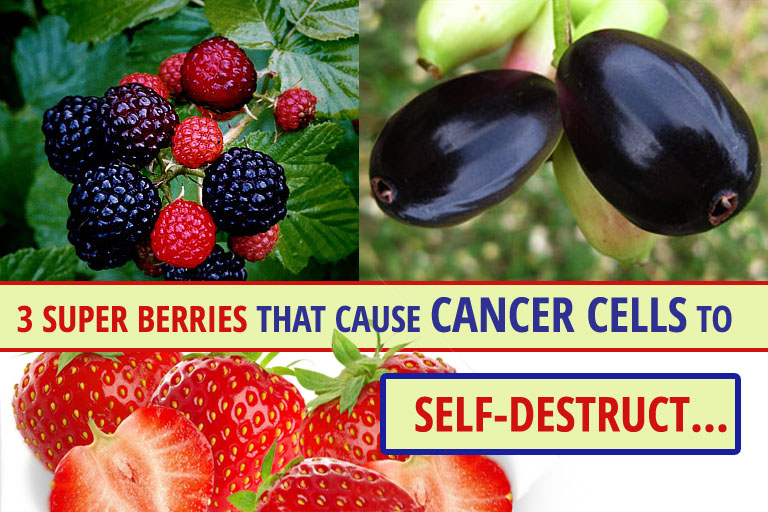By Daily Superfood Love

Super foods are not a new concept in the health and nutrition world, but we are proud to create the term “super berries.”
What is a super berry?
Super berries contain high amounts of specialized nutrients and powerful antioxidants that create apoptosis (pronounced a-pop-toe-ses).
Apoptosis, often called “cellular suicide,” is a natural process creating the fine balance between cell death and cell renewal. It’s a crucial system used by the body to get rid of cells that are abnormal, mutated, or no longer function properly.
Cancer cells alter and grow in a way that avoids the self-destruction caused by apoptosis. Traditional forms of cancer therapies such as radiation, drug therapy,
and chemotherapy can’t tell the difference between healthy cells and mutated cancerous cells – so all fast growing cells are destroyed, whereas apoptosis only targets cancerous cells.
Scientists have now discovered that certain super-foods and super berries can help prevent cancer and/or trigger natural cell death against cancer cells.
Since emerging evidence proves diet influences the cancer process before it begins, it is crucial you discover which foods can make a difference between preventing cancer or accelerating the spread of cancer.
The David Geffen School of Medicine at the University of California studied extracts of six popular berries: blackberry, black raspberry, blueberry, cranberry, red raspberry, and strawberry for their ability to stimulate apoptosis of the COX-2 colon cancer cell line.
The researchers also evaluated these berries for the prevention of oral, breast, colon, and prostate tumor cell growth. They learned black raspberry and strawberry extracts had the most effective apoptosis inducing effects.
Strawberries and raspberries – also contain a unique phytochemical called ellagic acid, which has the power to prevent skin, bladder, lung, esophagus, and breast cancers.
3 Apoptosis Inducing Super Berries That Target Cancer Cells
#1. Black raspberries – don’t let anyone tell you black raspberries are blackberries. They are not. The easiest way to differentiate between the two is where the stem attaches to the berry; black raspberries are hollow in the center like raspberries while blackberries have a white core. Black raspberries are rich in anthocyanins.
Studies have shown that this type of potent antioxidant found in berries, grapes, and red cabbage − give fruits and vegetables a blue, red, or purple color. These powerful compounds fight diseases caused by oxidative stress and free radicals including certain types of cancer, cardiovascular disease and chronic inflammation.
Cervical cancer is the second most common female cancer worldwide. One of the challenges in treating cervical cancer is that it is difficult to manage pre-invasive and invasive lesions. Recent studies from the College of Public Health at Ohio State University, Comprehensive Cancer Center in Columbus, Ohio, discovered that black raspberries prevent cervical cancer cell growth and tumor formation. Furthermore, they inhibit inflammation and induce apoptosis in esophageal and colorectal cancer tissues. Black raspberries also contain chemo preventive compounds, including: vitamins A, C, E, folic acid, ellagic acid, and quercetin that can help prevent strokes.
#2 Strawberries – The humble and widely loved strawberry has many benefits. Strawberries have proven to prevent heart attacks in women. In China, 36 participants at high risk for developing esophageal cancer ate strawberries for six months and researchers found that consuming strawberries prevented esophageal lesions from developing into tumors. What a powerful berry!
The volunteers drank freeze-dried strawberry powder mixed with water, since the freeze-dried process concentrates the benefits of the berries. Researcher Tong Chen discovered that 29 out of 36 participants had lesions revert from moderate to mild after six months of consuming two ounces of strawberries a day. The ellagic acid in strawberries deactivated specific carcinogens and decreased the replication of cancer cells.
#3 – Jamun berry (or Indian blackberry) – These juicy purple berries of the native Indian plant, Eugenia jambolana, known as Jamun, jambolan, or black plum are available in the United States, Florida, and Hawaii. The fruit has a sour-sweet taste and due to its tart nature, is usually eaten with a sprinkling of salt.
Traditionally Jamun is used in Ayurvedic medicine to treat digestive disorders, as an antimicrobial, and to control diabetes. Jamun is also a good source of potassium, magnesium, phosphorus, and vitamin C. The College of Pharmacy at the University of Rhode Island analyzed the extract of Jamun berries. They found it exhibited pro-apoptotic effects against breast cancer cells but not towards normal breast cells. This study reveals the potential benefits of Jamun berry extract against breast cancer.
Breast cancer accounts for more than 1 in 4 cancers diagnosed in women in the United States. Since the role of plant extracts are now emerging as equally effective therapies, these preventative strategies are definitely worth exploring as a safe and effective way to naturally prevent cancer.
These 3 powerful cancer-fighting berries are an essential part of your cancer prevention diet and have key nutrients that can reduce your risk of a stroke, prevent blood clots, and much more. Why not enjoy a bowl of these delicious berries right now?

No hay comentarios:
Publicar un comentario